How do you take the bitterness out of escarole soup?.Escarole is a fantastic leafy green that brings a slightly bitter bite to soups, making them more flavorful and complex. But sometimes, that bitterness can be a little too strong, overwhelming the dish instead of complementing it. If you’ve ever made escarole soup and found it too bitter for your taste, don’t worry—there are simple ways to mellow out the bitterness while keeping the soup delicious and well-balanced.
Let’s go over why escarole is bitter and how to reduce that bitterness while maintaining all the rich, comforting flavors of your soup.How do you take the bitterness out of escarole soup?.
Why Is Escarole Bitter?
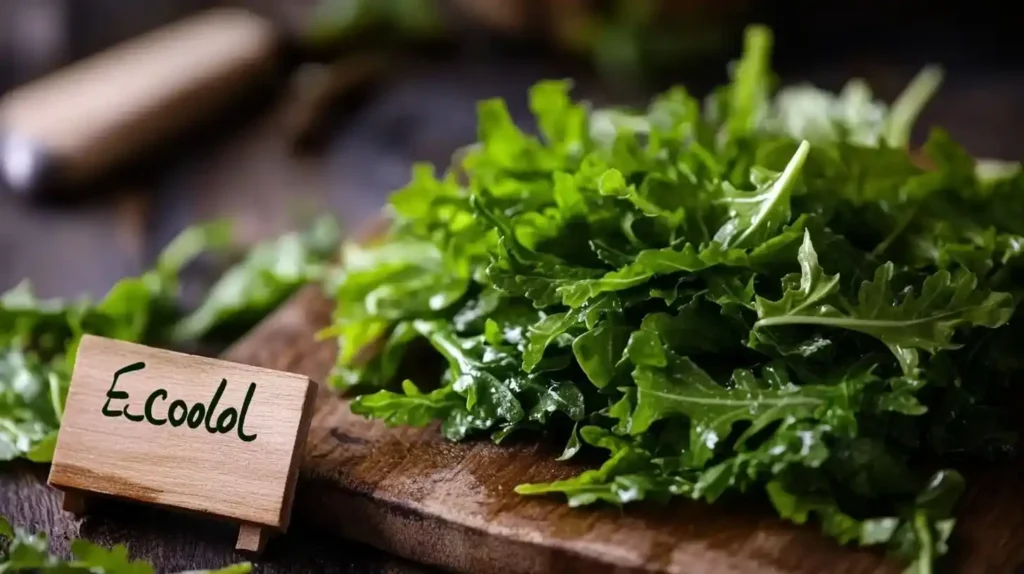
How do you take the bitterness out of escarole soup?. Escarole belongs to the chicory family, which includes radicchio, endive, and frisée—greens that naturally have a bitter taste. The bitterness comes from natural compounds that help protect the plant from pests. While some people love the slightly bitter flavor escarole brings to soups and sautés, others prefer a milder taste.How do you take the bitterness out of escarole soup?.
🥬 Curious about how escarole and beans became a classic pairing? Learn the history and nutritional benefits in this in-depth guide!👉👉The Truth About Escarole and Beans You Need to Know…
How to Reduce the Bitterness in Escarole Soup
How do you take the bitterness out of escarole soup?. If your escarole soup tastes too bitter, here are seven easy tricks to balance the flavors and make your soup more enjoyable.
1. Blanch the Escarole Before Adding It to the Soup
One of the easiest ways to remove bitterness is to blanch the escarole before cooking it in the soup.How do you take the bitterness out of escarole soup?.
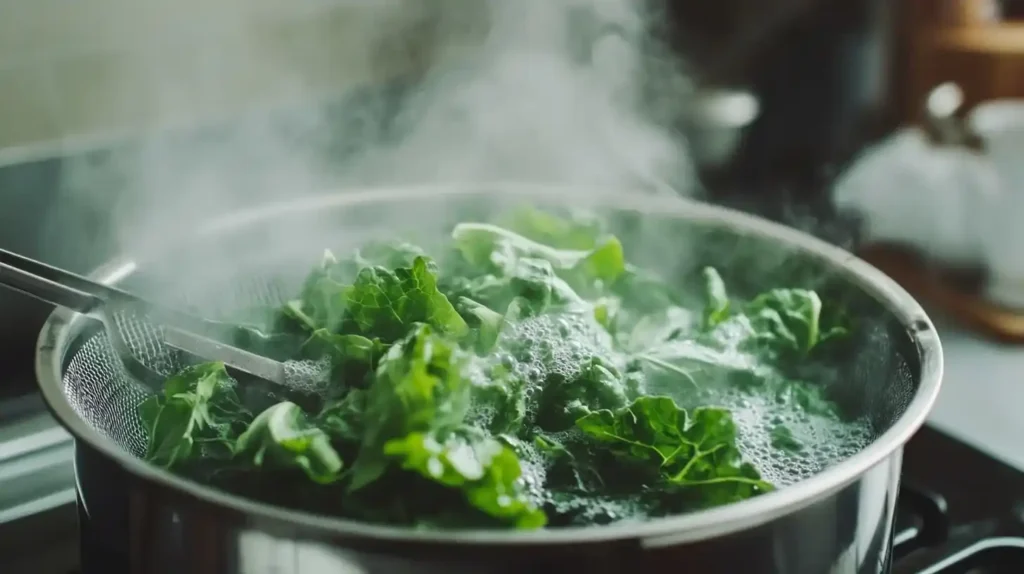
How to Blanch Escarole:
- Bring a pot of water to a rolling boil.
- Add the escarole and let it cook for 30-60 seconds.
- Drain it immediately and rinse with cold water to stop the cooking process.
- Squeeze out excess water and add it to your soup.
Blanching removes some of the bitter compounds while keeping the escarole tender and flavorful.
2. Balance Bitterness with Sweet or Acidic Ingredients
Adding sweet or acidic elements can counteract bitterness and create a well-rounded flavor.
- A splash of lemon juice or vinegar (such as red wine vinegar or apple cider vinegar) brightens the dish and cuts through bitterness.
- A small pinch of sugar or honey can subtly soften the bitter edge without making the soup sweet.
- Caramelized onions or roasted garlic add a touch of natural sweetness, mellowing out the bitterness.How do you take the bitterness out of escarole soup?.
3. Add a Creamy Element
Dairy products and other creamy ingredients help coat the tongue and reduce the perception of bitterness.

Try adding:
- A splash of heavy cream, milk, or half-and-half for a richer, smoother soup.
- A sprinkle of grated Parmesan or Pecorino Romano, which adds umami and balances the bitterness.
- A dollop of Greek yogurt or sour cream for a creamy, tangy contrast.
4. Let the Soup Simmer Longer
If your escarole soup tastes bitter right after adding the greens, give it more time. The longer escarole cooks, the more the bitterness fades.
Simmering for at least 20-30 minutes allows the flavors to meld, making the soup taste deeper and more balanced.How do you take the bitterness out of escarole soup?.
5. Add Starchy Ingredients to Absorb Bitterness
Starches can absorb some of the bitter compounds while adding heartiness to your soup.
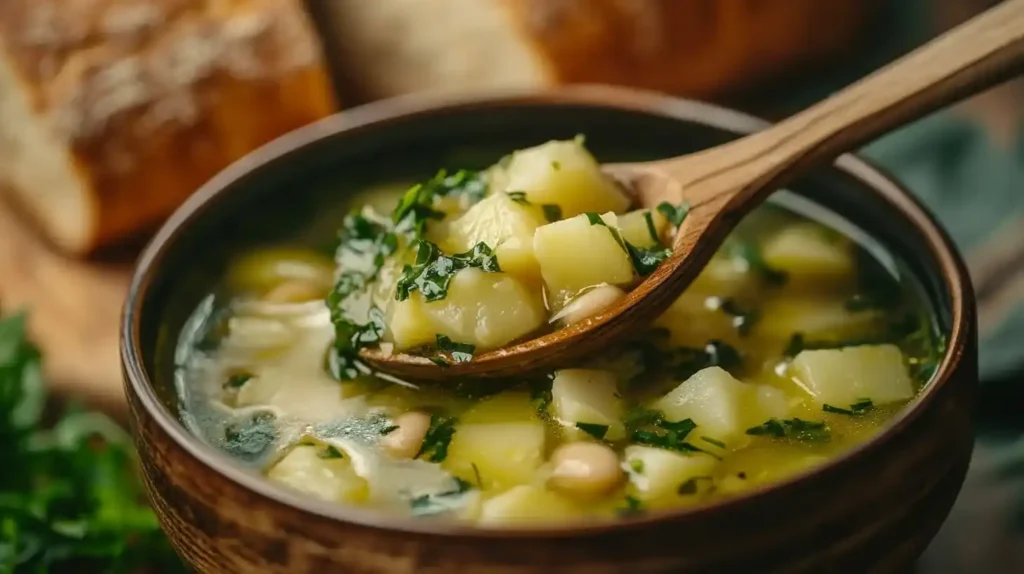
Try mixing in:
- Diced potatoes – These help soak up bitterness and make the soup creamier.
- Rice or pasta – They add texture while mellowing the bitterness.
- Beans (like cannellini or chickpeas) – They blend well with escarole and balance out strong flavors.How do you take the bitterness out of escarole soup?.
🥔 Did you know that gluten plays a key role in thickening soups and balancing flavors? Learn more about how gluten works in cooking here!👉👉What Is the Trick to Making Good Gluten?…
6. Incorporate Fats for a Smoother Flavor
Fat helps coat your palate and reduces the perception of bitterness.
- A drizzle of olive oil before serving adds richness and smooths out the flavors.
- A pat of butter stirred in at the end creates a silkier texture.
- Cooking escarole in bacon or pancetta fat before adding broth infuses it with delicious savory depth.How do you take the bitterness out of escarole soup?.
7. Use a Flavorful, Well-Seasoned Broth
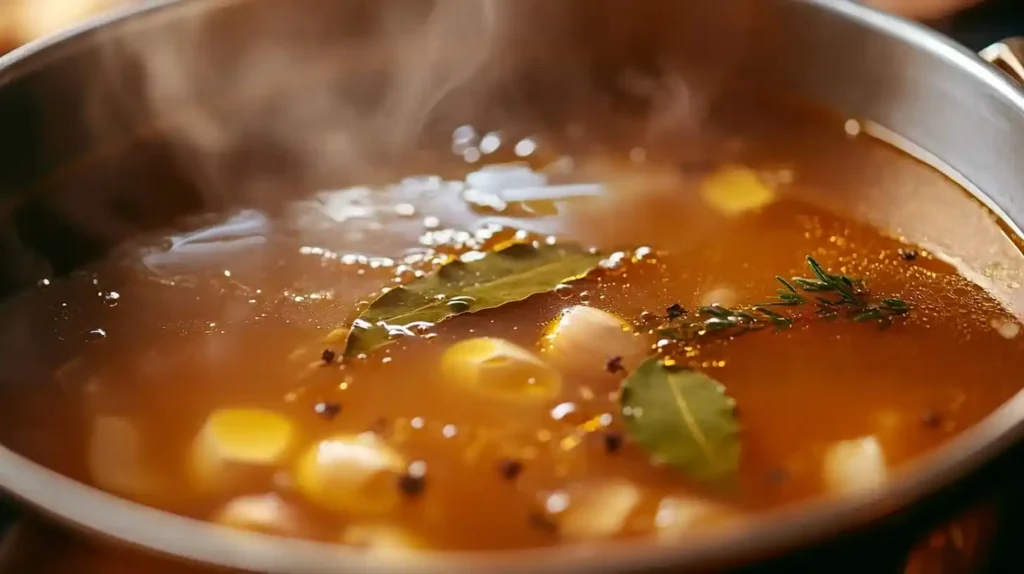
If you’re making escarole soup, the broth is just as important as the greens. A bland broth can make bitterness stand out more, so use a rich, flavorful base.
- Chicken or vegetable broth gives the soup depth and warmth.
- Homemade stock has more natural sweetness than store-bought versions, making it a great choice.
- Herbs like thyme, basil, or bay leaves add extra layers of flavor, helping to balance the bitterness.How do you take the bitterness out of escarole soup?.
🍛 A flavorful broth is the key to great soup! If yours is missing something, check out this guide for expert tips on how to fix bland bean soup.👉👉Bean Soup Lacking Flavor? Here’s How to Save It!…
Variations of Escarole Soup
1. Classic Italian Wedding Soup
- Add mini meatballs (beef, pork, or chicken).
- Stir in small pasta like acini di pepe or orzo.
- Finish with a whisked egg mixture to create egg ribbons.
2. White Bean and Escarole Soup
- Add cannellini or navy beans for a creamy, protein-packed soup.
🥗 Looking for a unique side dish to serve with your soup? Try Frog Eye Salad, a fun and refreshing pasta-based dish that surprises everyone! 👉👉 What Is Frog Eye Salad?…
- Use rosemary, thyme, and garlic for extra depth of flavor.
- Blend a portion of the beans for a thicker consistency.
3. Spicy Sausage and Escarole Soup
- Brown Italian sausage (spicy or mild) before adding escarole.
- Toss in red pepper flakes for heat.
- Serve with crusty bread to soak up the broth.How do you take the bitterness out of escarole soup?.
FAQs How do you take the bitterness out of escarole soup?
1. Why does escarole taste bitter?
Escarole is part of the chicory family, which naturally contains bitter compounds that help protect the plant from pests. The older the leaves, the more pronounced the bitterness can be. Cooking methods like blanching, simmering, or pairing with sweet and acidic ingredients help balance this flavor.How do you take the bitterness out of escarole soup?.
2. Can I use another leafy green instead of escarole?
Yes! If you prefer a milder taste, try spinach, Swiss chard, kale, or even Napa cabbage. These greens offer a similar texture but with less bitterness. However, if you’re replacing escarole in Italian Wedding Soup, consider using collard greens or baby kale for a comparable texture.
3. What is the best way to store leftover escarole soup?
Store leftover escarole soup in an airtight container in the refrigerator for up to 3 days. If freezing, let the soup cool completely, then freeze it in a sealed container for up to 3 months. When reheating, warm it over low heat on the stovetop, adding a little extra broth if needed.
🥞 Need a delicious breakfast idea for the next day? Try these Banana Chocolate Chip Pancakes—fluffy, sweet, and absolutely irresistible! 👉👉The Best Banana Chocolate Chip Pancakes Ever…
How do you take the bitterness out of escarole soup?
How do you take the bitterness out of escarole soup?. Escarole soup is a classic, comforting dish, but its natural bitterness can sometimes be overpowering. Fortunately, a few simple tricks—blanching, adding sweetness or acidity, incorporating creamy elements, simmering longer, and using starchy or fatty ingredients—can help create a perfectly balanced, delicious soup.
So next time your escarole soup turns out a little too bitter, try one (or a combination) of these methods, and you’ll have a warm, flavorful, and well-rounded dish that everyone will love.How do you take the bitterness out of escarole soup?.
🍮 End your meal on a sweet note with this Sticky Toffee Pudding Brownie—a rich and indulgent dessert that pairs perfectly with a cozy bowl of soup!👉👉Sticky Toffee Pudding with Brownie…
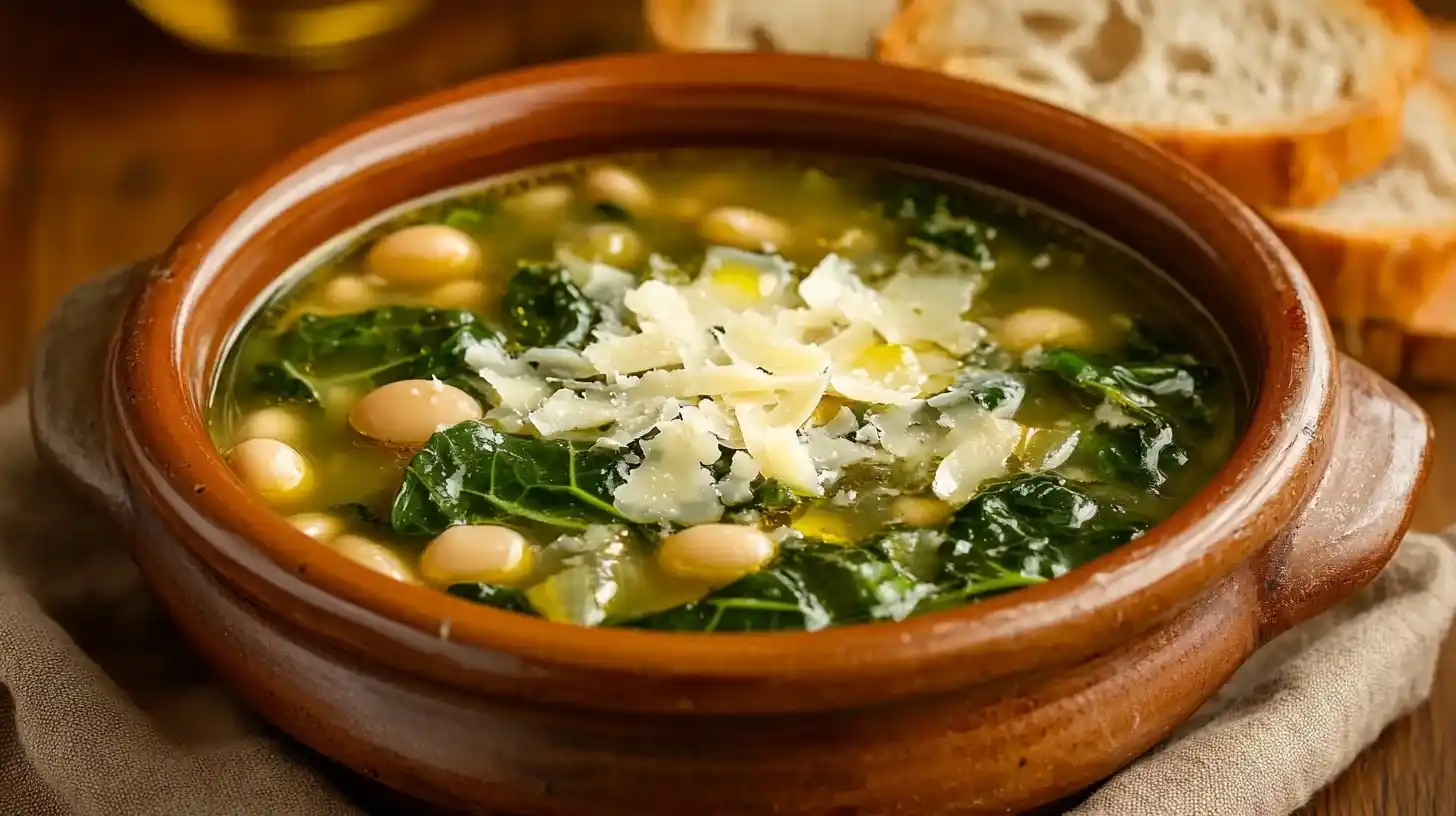
How do you take the bitterness out of escarole soup?5 Secrets
Ingredients
For the Soup:
- Escarole – A slightly bitter leafy green that softens beautifully in soup.
- Olive oil – Adds richness and enhances the flavors.
- Garlic cloves – Infuses the broth with a deep savory taste.
- Onion – A flavorful base for the soup.
- Carrots & Celery – Provide natural sweetness and texture.
- White beans cannellini or navy beans – Make the soup creamy and hearty.
- Chicken or vegetable broth – The base of the soup packed with umami.
- Parmesan rind – Adds depth and a hint of cheesiness.
- Red pepper flakes optional – For a touch of heat.
- Salt & black pepper – To season and balance the flavors.
- Lemon juice or vinegar – Brightens the soup and reduces bitterness.
Instructions
1️⃣ Blanch the Escarole (Optional, to Reduce Bitterness):
- Bring a pot of water to a rolling boil and add the escarole.
- Blanch for 30-60 seconds, then drain and rinse with cold water.
- Squeeze out excess water and set aside.
2️⃣ Sauté the Aromatics:
- Heat olive oil in a large pot over medium heat.
- Add onions, carrots, and celery; cook until softened, about 5 minutes.
- Stir in garlic and red pepper flakes (if using) and cook for 30 seconds until fragrant.
3️⃣ Simmer the Soup:
- Add the blanched escarole, white beans, broth, and Parmesan rind to the pot.
- Bring to a boil, then reduce heat and let simmer for 20-30 minutes.
4️⃣ Finish & Serve:
- Remove the Parmesan rind.
- Stir in a splash of lemon juice or vinegar to brighten the flavors.
- Season with salt and pepper to taste.
- Serve hot with freshly grated Parmesan and crusty bread.
Notes
- For Extra Creaminess: Blend half of the white beans before adding them to the soup.
- Make It More Filling: Add shredded chicken, sausage, or pasta for a heartier dish.
- Storage: Store in the fridge for up to 3 days or freeze for up to 3 months.
- Reduce Bitterness: Blanching the escarole, adding a splash of acid (lemon juice/vinegar), or simmering longer helps tone down bitterness.
